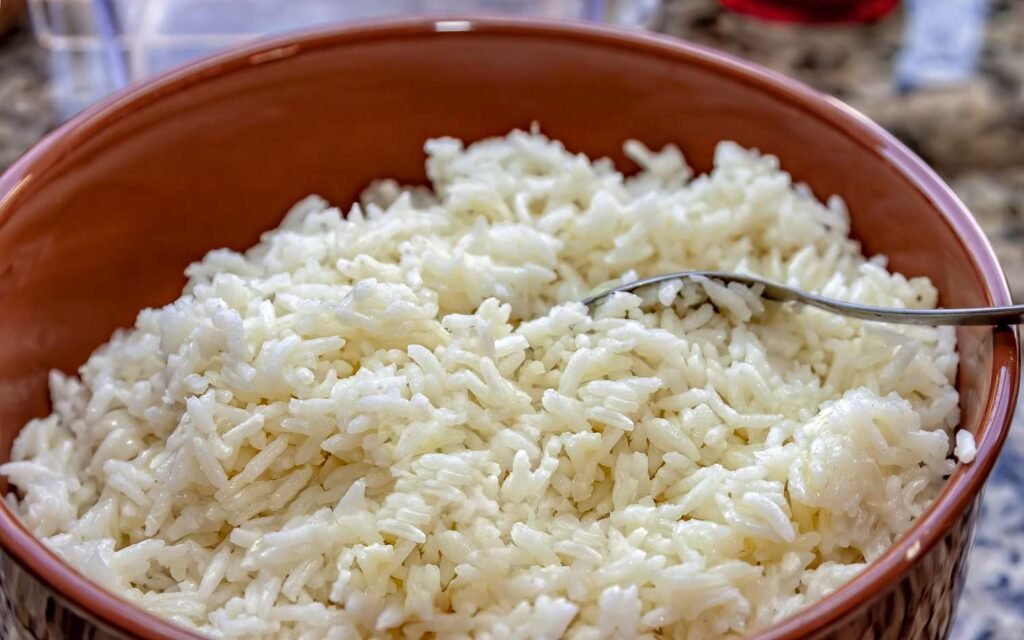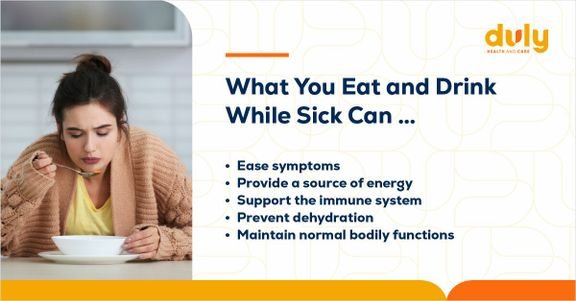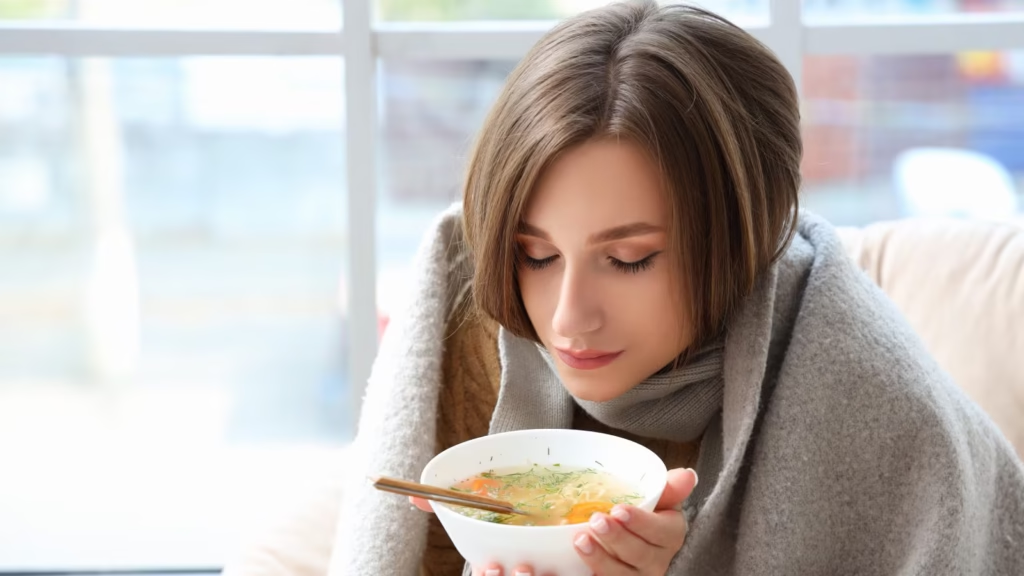Introduction
When you’re sick, eating often feels like the last thing you want to do. Loss of appetite, nausea, sore throat, or fatigue can make food seem unappealing. Yet, what you eat during illness can make a big difference in how quickly you recover. The right foods can support your immune system, soothe your stomach, reduce inflammation, and help you regain strength.
Whether you’re battling a cold, flu, fever, or stomach upset, understanding what to eat and what to avoid is key to faster healing. This guide will walk you through the best foods to eat when you’re sick, why they help, and how to prepare simple meals that your body can easily digest. You’ll also learn how to hydrate properly, which foods to skip, and how to nourish your body gently until your energy and appetite return.

Why Nutrition Matters When You’re Sick
Your body works overtime when fighting illness. The immune system burns through energy, vitamins, and minerals to repair tissues and combat infection. Proper nutrition provides fuel for this healing process. Even if your appetite is low, eating small, nutrient-rich meals keeps your strength up and supports faster recovery.
When you’re sick:
- Protein helps repair cells and boost immune response.
- Vitamins and minerals like vitamin C, zinc, and iron help fight infections.
- Hydration prevents dehydration and helps regulate body temperature.
- Electrolytes maintain muscle and nerve function, especially if you’ve been vomiting or sweating.
The goal is to eat foods that are soothing, easy to digest, and packed with nutrients — without overloading your digestive system.
Best Foods to Eat When You’re Sick
1. Warm Soups and Broths
Chicken or vegetable broth is one of the most comforting options when you’re sick. It hydrates the body, provides electrolytes, and is gentle on the stomach. Warm soups can also ease nasal congestion and sore throats. Add soft vegetables or small pieces of lean chicken for extra nourishment.
2. Oatmeal and Porridge
Soft, warm oatmeal or porridge is soothing, easy to swallow, and provides slow-releasing energy. It’s ideal for when you’re weak or have a sore throat. You can enhance it with a little honey, banana, or cinnamon for added flavor and nutrition.
3. Bananas
Bananas are gentle on the stomach and a great source of potassium, which helps restore electrolytes lost through fever, vomiting, or diarrhea. They’re a key part of the BRAT diet — Bananas, Rice, Applesauce, and Toast — commonly recommended for stomach flu.
4. Rice, Toast, and Crackers
Plain, bland foods like white rice, dry toast, or saltine crackers are perfect when your stomach is sensitive. They’re easy to digest and won’t irritate your digestive tract.
5. Boiled or Mashed Potatoes
Potatoes provide carbohydrates for energy and are easy to digest. Mashed or boiled potatoes without butter or spices are gentle and comforting when you’re feeling weak.
6. Eggs
Scrambled, boiled, or poached eggs are an excellent source of protein and B vitamins. They’re soft, mild, and quick to prepare, making them ideal for recovery meals.
7. Yogurt and Probiotic Foods
Plain yogurt with live cultures helps restore healthy gut bacteria, which can be disrupted during illness. It’s especially beneficial after antibiotics or stomach flu. Avoid sugary or flavored yogurts.
8. Ginger and Herbal Teas
Ginger has natural anti-inflammatory and anti-nausea properties. Sipping ginger tea or adding fresh ginger to hot water can soothe nausea and aid digestion. Chamomile, peppermint, and honey-lemon teas also help calm the stomach and ease sore throats.
9. Fruits Rich in Vitamin C
Oranges, strawberries, kiwi, and papaya contain vitamin C, which supports immune function and helps shorten illness duration. If your throat hurts, opt for softer or blended fruits like smoothies to make swallowing easier.
10. Vegetables and Leafy Greens
Cooked carrots, spinach, or zucchini are easy to digest and loaded with vitamins and minerals. Leafy greens contain antioxidants that strengthen your immune system and help fight infection.

Best Foods for Specific Illnesses
If You Have a Cold or Flu
- Chicken soup
- Garlic and ginger tea
- Warm lemon water with honey
- Steamed vegetables
- Smoothies with banana and spinach
These foods soothe your throat, provide hydration, and strengthen immunity.
If You Have a Fever
- Water, electrolyte drinks, or coconut water for hydration
- Porridge, soups, and soft fruits
- Avoid heavy, oily, or spicy foods
- Eat small, frequent meals to maintain energy
If You Have a Stomach Bug
- BRAT diet (Banana, Rice, Applesauce, Toast)
- Clear broth and herbal teas
- Avoid dairy, caffeine, and greasy food
- Stick to bland, low-fat meals until digestion improves
If You Have a Sore Throat
- Warm teas with honey
- Smooth soups
- Mashed potatoes or oatmeal
- Avoid acidic foods like citrus juice or spicy dishes
If You Have Nausea or Vomiting
- Ginger or peppermint tea
- Crackers or dry toast
- Mashed banana or applesauce
- Eat in very small portions and sip fluids regularly

What to Drink When You’re Sick
Hydration is just as important as food. Illness causes fluid loss through fever, sweating, or vomiting. Here’s what to drink:
- Water: Sip frequently throughout the day.
- Broth or clear soup: Restores electrolytes and hydrates.
- Coconut water: Natural source of electrolytes.
- Herbal teas: Chamomile, ginger, and peppermint calm the stomach.
- Honey-lemon water: Soothes sore throat and provides vitamin C.
Avoid sugary drinks, alcohol, and caffeinated beverages, which can cause dehydration or irritate your stomach.
Foods to Avoid When You’re Sick
Some foods can worsen symptoms or slow your recovery. Avoid the following:
- Spicy foods: Can irritate the stomach and throat.
- Fried and fatty foods: Hard to digest and can cause nausea.
- Caffeinated drinks: Increase dehydration.
- Dairy products: May worsen congestion in some people.
- Sugary foods: Weaken immune function and increase inflammation.
- Acidic fruits and juices: Can irritate sore throats or sensitive stomachs.
Stick to soft, mild foods until you feel stronger.
How to Eat When You’re Sick
- Eat small meals frequently: Don’t force large portions.
- Choose soft textures: Soups, mashed vegetables, or smoothies are easier to handle.
- Keep food warm, not hot: Warm meals soothe the throat and aid digestion.
- Listen to your body: Eat when you’re hungry, and rest when you’re not.
- Rest after eating: Give your body time to digest and recover.
One-Day Meal Plan for Recovery
| Time | Meal | Description |
|---|---|---|
| Morning | Oatmeal with banana | Gentle start with energy and potassium |
| Mid-Morning | Ginger tea or honey-lemon water | Calms throat and stomach |
| Lunch | Chicken soup with rice and vegetables | Hydrating and nourishing |
| Afternoon | Yogurt with soft fruits | Protein and probiotics |
| Dinner | Mashed potatoes with boiled egg | Comforting and rich in nutrients |
| Before Bed | Warm chamomile tea | Promotes relaxation and sleep |
How Long to Follow a “Sick Diet”
You should stick to a light, gentle diet until your symptoms fade and your appetite returns. As your body heals, gradually reintroduce solid foods. For stomach-related illness, continue bland foods for at least 24 hours after symptoms stop. For colds or flu, resume normal eating once energy levels improve.

When to See a Doctor
If you experience any of the following, seek medical help immediately:
- High fever lasting more than three days
- Severe dehydration or dizziness
- Persistent vomiting or diarrhea
- Inability to eat or drink anything for more than 24 hours
- Signs of infection such as chest pain or shortness of breath
Read More: Keto-Friendly Fast Food: What to Order on the Go
Conclusion
Food is more than fuel — it’s part of the healing process. When you’re sick, gentle and nourishing foods help your body recover faster. Focus on hydration, light meals, and ingredients that calm the stomach and support your immune system. Broths, soups, bananas, oatmeal, eggs, and herbal teas are some of the best options for recovery.
Avoid heavy, greasy, or spicy meals that strain digestion. Remember to eat slowly, rest often, and stay hydrated. Your body needs energy to fight infection and rebuild strength, so even small amounts of nutritious food make a difference. Listen to your body’s cues and don’t rush recovery — give yourself the care and nourishment you deserve.
FAQs
1. What should I eat when I have no appetite while sick?
Eat small portions of easy foods like soups, smoothies, oatmeal, or yogurt. Even a few bites can give your body energy to heal.
2. Is it okay to drink milk when sick?
If milk doesn’t cause discomfort or congestion, it’s fine. Choose low-fat milk or yogurt for protein and calcium.
3. What foods help recover from a cold fastest?
Soups, citrus fruits, garlic, and green leafy vegetables boost immunity and shorten recovery time.
4. What should I avoid when I’m sick?
Avoid fried, spicy, or sugary foods, caffeine, and alcohol, as they can worsen symptoms and slow recovery.
5. How often should I eat when sick?
Eat small, frequent meals every 2–3 hours. This keeps your energy up without overwhelming your digestive system.